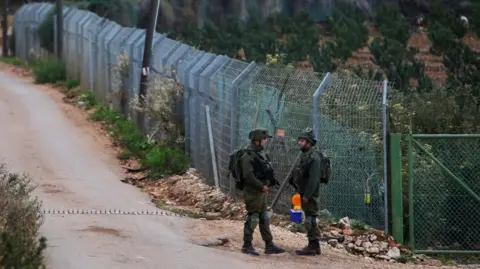Israel warns Lebanon after first rocket attack since ceasefire
28 minutes agoHugo BachegaBBC Middle East correspondentReporting fromBeirutJaroslav LukivBBC NewsReporting fromLondon

 Reuters
ReutersIsrael has warned it will “respond severely” after rockets were fired from Lebanon – the first since a bilateral ceasefire deal came into effect in November.
Sirens were heard in the northern Israeli town of Metula on Saturday morning and the Israel Defense Forces (IDF) said three rockets were intercepted. No injuries were reported.
No group has admitted firing the rockets. Lebanon’s prime minister asked the military to take steps to prevent the country being dragged “into a new war”.
IDF chief Eyal Zamir, however, said the “state of Lebanon bears responsibility” for upholding the ceasefire deal that ended 14 months of fighting with Hezbollah, the Lebanese armed group backed by Iran..
Local reports in Lebanon said artillery fire had been fired into some southern locations of the country. Israel has not confirmed.
The truce has been fragile: Israel has carried out nearly daily air strikes on what it describes as Hezbollah targets, and has indicated that attacks will continue to prevent the group from rearming.
In addition to that, the Israeli military is still occupying five locations in southern Lebanon, in what the Lebanese government says is a violation of the country’s sovereignty and a breach of the ceasefire deal, which required the withdrawal of Israeli troops.
Israel says the Lebanese military has not yet fully deployed to those areas, and that it needs to remain in those points to guarantee the security of its border communities.
Saturday’s rocket attack into Israel will put even more pressure on the Lebanese government, and probably be used as proof by Israel that the Lebanese army does not have full control of border areas.
Despite Israel’s constant attacks, Hezbollah has not responded. The group faces the huge challenge of providing financial help to its communities affected by the war, and pressure from its opponents to disarm.
Lebanon’s President Joseph Aoun, who came to power in January, has said only the state should have arms in the country, in what is seen as a reference to Hezbollah’s arsenal. Lebanon’s international partners say they will only help the country if the government acts to curb Hezbollah’s power.
Hezbollah launched its campaign the day after the Hamas attacks on southern Israel on 7 October 2023, saying it was acting in solidarity with Palestinians in the Gaza Strip.
The longstanding conflict escalated and led to an intense Israeli air campaign across Lebanon, the assassination of Hezbollah’s senior leaders and a ground invasion of southern Lebanon.
The offensive killed about 4,000 people in Lebanon – including many civilians – and led to the displacement of more than 1.2 million residents.
Israel’s stated goal in its war against Hezbollah was to allow the return of about 60,000 residents who had been displaced from communities in the country’s north because of the group’s attacks, and to remove it from areas along the border.